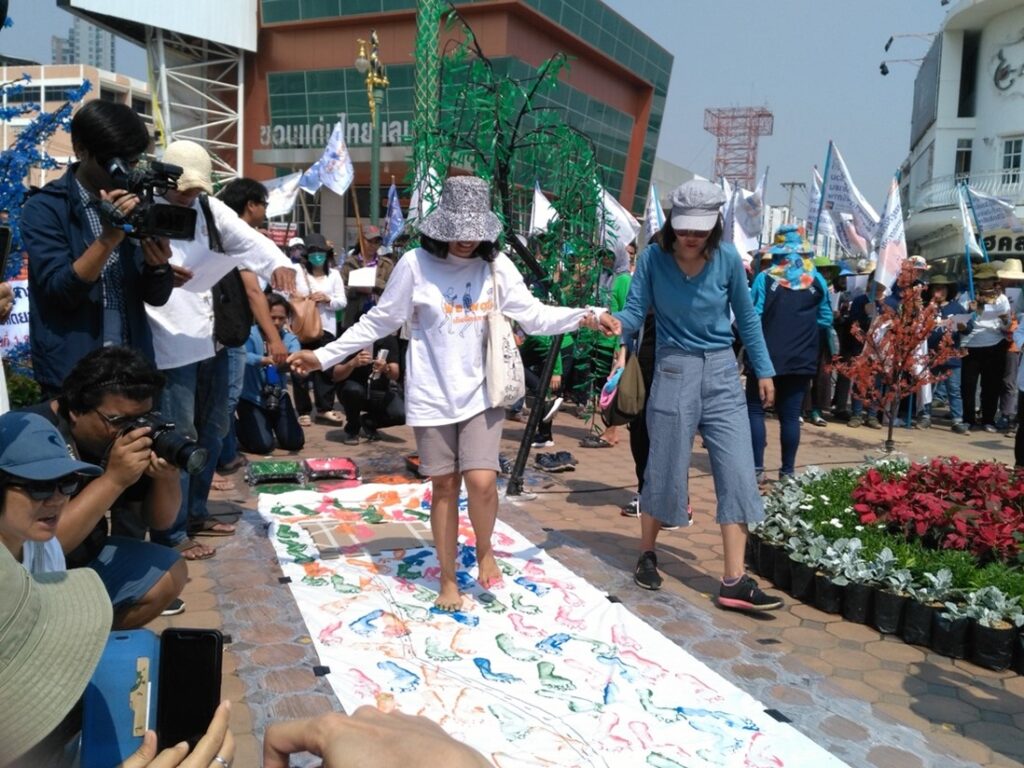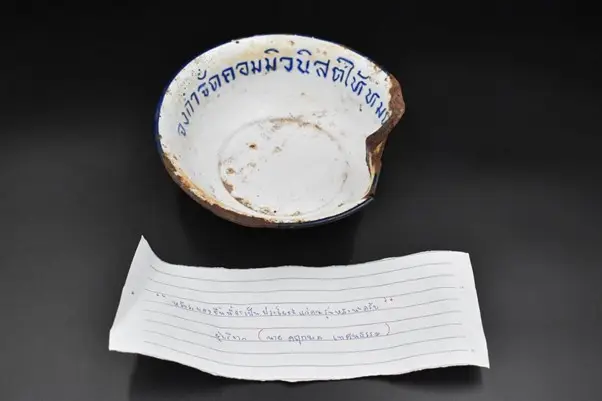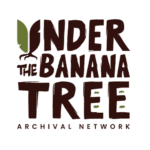
The foot print fabric that led to the birth of the Museum of Popular History
Recent statistics estimate that there are about 1,600 Museums in Thailand, with most focused on natural history, science and technology, art history and culture. While some museums tell the story of Thai political history, their narratives usually focus on the role of the elites and leave no room for “political life” of commoners. The Thai Labour Museum is among a few museums with dedicated space to tell stories of the political struggle of ordinary people. However, given the Thai Labour Museum’s main focus on the labor movement, stories of other political or social movements are at risk to be left behind.
With this challenge, Anon Chawalawan, founder of the Museum of Popular History then decided to start collecting materials that were used in the struggle of political or social movements in Thailand with the hope of preserving stories of popular movements and to pass on stories to the future generation.
Beginnings
Before creating the museum, I worked with iLaw – a small human rights organization in Bangkok. At that time Thailand was ruled by military regime that taken power by force since 2014. I was impressed with creativity of the Thai activists that use symbolism and humor as tools to oppose the military regime. I started to collect political artifacts that were used in the protest to build a personal collection.
The idea to create the museum was developed after I joined the “We Walk” march, where activists marched 400 kilometers from Bangkok to Khon Kaen to campaign for Community Rights and demand for the new Constitution. After a month-long walk under pressure and intimidation by the local authorities, the group successfully reached Khon Kaen. To conclude the march, the participants used color to make their footprints on the white fabric sheet at the Democracy Monument in Khon Kaen as a symbol of victory. I tried to contact the organizers to obtain the footprint sheet but it was nowhere to be found. At that moment, I realized that because CSOs and their movements were busy with the tasks at hand, it was difficult for them to systematically collect and preserve these campaign materials – hence some materials that had historical value were lost forever. Inspired by the work of the International Institute of Social History in Amsterdam and other museums that dedicate themselves to keeping memories and stories of the people’s struggle, I decided to kick-start the Museum of Popular History Project in 2018.
Caretaker not owner
Collection gathering was a major challenge that the museum faced in its early stage. Campaign materials like t-shirts, banners or other merchandise could be found easily while the campaigns were active, but after the protest or the campaign were concluded these items were not usually available in the market. Given that the major political movements including the Yellow Shirt (movement against the former Prime Minister Thaksin Shinawatra), the Red Shirt (movement to oppose 2006 Coup d etat and oppose former Prime Minister Abhisit Vejjajiva) and the PDRC (movement to oppose Prime Minister Yingluck Shinawatra that demand to postpone the 2014 Election and calling for political reform before the election) ended for several years before the museum project started, the acquisition of these collection seemed to be impossible. Fortunately, some political activists who collected these materials had reached out to the museum with a desire to donate their collection so it can be brought into the light.

A propaganda bowl with a message “Do get rid of the Communist from the Thai society with note from the donor “Hopefully this object will benefit to the later generation.”
In some cases, the donations to the collection also came with impressive story. A fruit gardener in the Northeastern Province found a bowl that had an anti-Communist propaganda message buried underneath his land, likely for over 30 years. After the fruit gardener found the bowl, he posted its photo on his social network channel. He was later contacted by independent collectors offering about 300 US Dollars to purchase the bowl. However, when the museum contacted him and asked for the donation of the bowl, the fruit gardener immediately agreed to donate the bowl to the museum. In a package that the fruit gardener sent to the museum he also wrote a little note “Hopefully this object will benefit to the later generation.” To fulfill commitment to the donor, the museum always brought the bowl to display in the event to commemorate the anniversary of 6 October 1976 massacre at Thammasat University as well as in other exhibitions. The museum also leased the bowl without cost to student activists or civil society groups upon their request for the purpose of academic or public exhibition.
Since over 50 % of the collections have been donated by different groups or individual collectors, the museum then holds the principle that collection in the museum belongs to the public. The museum only has a duty and responsibility to preserve the collection and make sure that the public can access all the collections easily. It has shown the collection in various exhibitions including ‘Bangkok Through Poster’ (2024), ‘Diary of the People’ (2024) at the Jim Thompson Centre, ‘Evidence of Resistance’ at Thammasat University (2023), ‘Unmute 112’ (2021) at the Bangkok Art Book Fair (2021), and ‘Unwritten History’ at Many Cuts Art Space (2020).
After 7 years of existence, collection of museums is slowly growing. It currently has over 500 political and campaign t-shirts ranging from political campaigning, political satire, environment and gender etc. It also had collections of banners, pamphlets, posters and other materials that were used as campaign material from various movements from all political spectrums. The museum also became known among the Thai political activists and CSO as the hub of material whenever the groups need collection that can support their campaign. Its mission remains committed to raising awareness that the political actions of ordinary people can contribute to the political development of the nation.
Anon lead the exhibition tour on 26 February 2022
